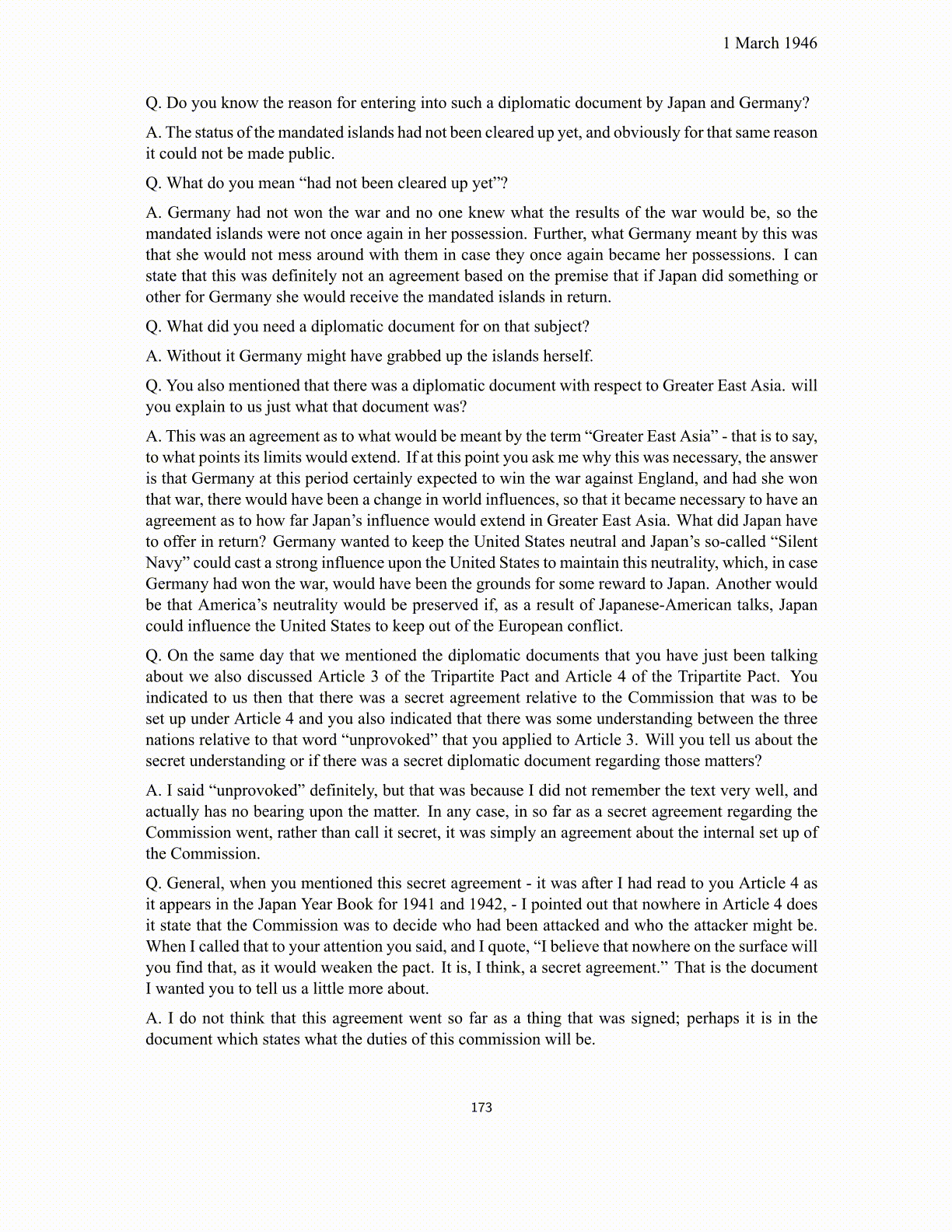
1 March 1946 Q. Do you know the reason for entering into such a diplomatic document by Japan and Germany? A. The status of the mandated islands had not been cleared up yet, and obviously for that same reason it could not be made public. Q. What do you mean “had not been cleared up yet”? A. Germany had not won the war and no one knew what the results of the war would be, so the mandated islands were not once again in her possession. Further, what Germany meant by this was that she would not mess around with them in case they once again became her possessions. I can state that this was definitely not an agreement based on the premise that if Japan did something or other for Germany she would receive the mandated islands in return. Q. What did you need a diplomatic document for on that subject? A. Without it Germany might have grabbed up the islands herself. Q. You also mentioned that there was a diplomatic document with respect to Greater East Asia. will you explain to us just what that document was? A. This was an agreement as to what would be meant by the term “Greater East Asia” - that is to say, to what points its limits would extend. If at this point you ask me why this was necessary, the answer is that Germany at this period certainly expected to win the war against England, and had she won that war, there would have been a change in world influences, so that it became necessary to have an agreement as to how far Japan’s influence would extend in Greater East Asia. What did Japan have to offer in return? Germany wanted to keep the United States neutral and Japan’s so-called “Silent Navy” could cast a strong influence upon the United States to maintain this neutrality, which, in case Germany had won the war, would have been the grounds for some reward to Japan. Another would be that America’s neutrality would be preserved if, as a result of Japanese-American talks, Japan could influence the United States to keep out of the European conflict. Q. On the same day that we mentioned the diplomatic documents that you have just been talking about we also discussed Article 3 of the Tripartite Pact and Article 4 of the Tripartite Pact. You indicated to us then that there was a secret agreement relative to the Commission that was to be set up under Article 4 and you also indicated that there was some understanding between the three nations relative to that word “unprovoked” that you applied to Article 3. Will you tell us about the secret understanding or if there was a secret diplomatic document regarding those matters? A. I said “unprovoked” definitely, but that was because I did not remember the text very well, and actually has no bearing upon the matter. In any case, in so far as a secret agreement regarding the Commission went, rather than call it secret, it was simply an agreement about the internal set up of the Commission. Q. General, when you mentioned this secret agreement - it was after I had read to you Article 4 as it appears in the Japan Year Book for 1941 and 1942, - I pointed out that nowhere in Article 4 does it state that the Commission was to decide who had been attacked and who the attacker might be. When I called that to your attention you said, and I quote, “I believe that nowhere on the surface will you find that, as it would weaken the pact. It is, I think, a secret agreement.” That is the document I wanted you to tell us a little more about. A. I do not think that this agreement went so far as a thing that was signed; perhaps it is in the document which states what the duties of this commission will be. 173